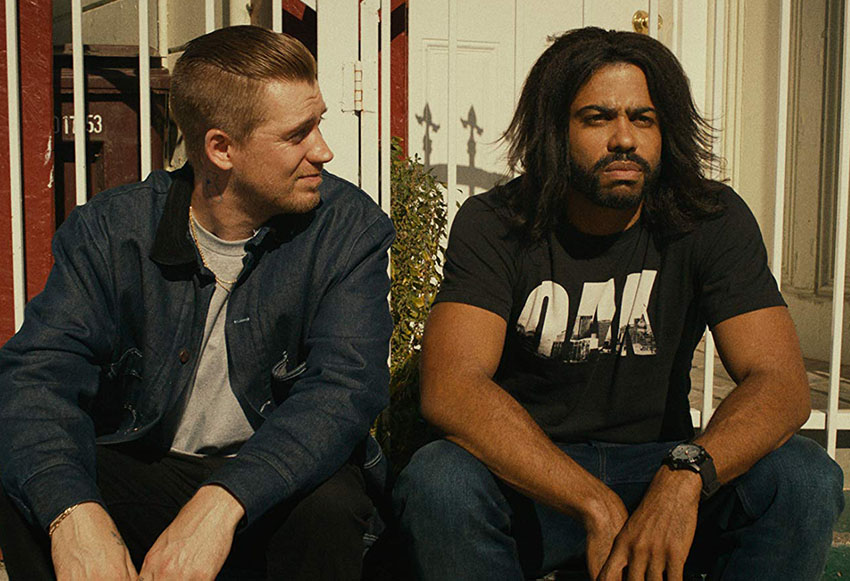 The trailer for Blindspotting does a poor job of suggesting the best of the movie’s nuances. As far as the idea of trailers as advertisements for films goes, it does a good job of titillating interest for what seems to be a timely film about police violence and the racial politics of Oakland, California. But, Blindspotting is more thoughtful and more unusual than that. At its best, and even when it flirts with its worst inclinations, this 90-minute gentrification comedy is wholly its own thing and the fact that it made it to release (almost a decade after its conception) and was released in Guyana’s notably anti-independent film market (albeit for one brief week) makes me hopeful for the mainstream film industry.
The trailer for Blindspotting does a poor job of suggesting the best of the movie’s nuances. As far as the idea of trailers as advertisements for films goes, it does a good job of titillating interest for what seems to be a timely film about police violence and the racial politics of Oakland, California. But, Blindspotting is more thoughtful and more unusual than that. At its best, and even when it flirts with its worst inclinations, this 90-minute gentrification comedy is wholly its own thing and the fact that it made it to release (almost a decade after its conception) and was released in Guyana’s notably anti-independent film market (albeit for one brief week) makes me hopeful for the mainstream film industry.
The set-up establishes a built-in case of dread. Convicted felon Collin (Daveed Diggs) and his childhood friend Miles (poet turned actor Rafael Casal) are trying to get through Collin’s last three days of a year-long probation stint. The two work with a moving company, spending most of their days moving things in or out of a rapidly gentrifying Oakland, a town they’ve watched mutate over the course of the last two decades. Late one night, Collin witnesses a policeman violently gunning down a black man and the image haunts him for the rest of the film. The moment is not a non sequitur and sets up an important part of the film’s coda. It makes sense, then, that the promotion for the film frontloads this part of it – emphasising the sadly perennially timely subject of police brutality makes sense. But that’s not all there is to Blindspotting, and perhaps not even the key to what makes this film so effective.
Diggs and Casal, who wrote the script together over a course of nine years, make a deft choice by keeping Collin’s crime something of a mystery for the first half of the film. It’s a bit of a familiar “trick,” for we suspect early on that there’s something bizarre about his imprisonment, even if we do not know what. Collin seems to define the idea of reluctant felon. Two excellent things come out of this decision. The revelation of Collin’s “crime”, represented in a sort of memory play by a peripheral character manages to be both the funniest and most horrifying sequence in the film. Blindspotting gets the bathetic nature of tragedy and humour and the way distance from the ramifications of an incident can make it funny rather than terrifying.
The “last three days of parole” scenario allows for a looseness to the film’s structure. We anticipate chaos and wait, as the dread amps up, for the moment to come. It’s not just our built-in expectation of something bad happening, director Carlos López Estrada does a good job of eking out the tension in his debut film. Even when at its most fun and funniest (all of Miles and Collins’ escapades suggest a sort of buddy comedy that we’d be willing to spend hours watching: the straight man and his madcap best friend), there’s the suggestion of something slightly uneasy waiting to be faced, and when that uneasiness finally gives way to destruction in a well distilled “Chekhov’s gun” sort of sequence, the sparks that fly are worth it. And Blindspotting becomes less about gentrification and the threat of police violence than about the way that friendship can calcify and become an albatross rather than a boon. Tony winner Diggs gets a big screen performance to argue for his value as a film actor and he’s matched at every step by Casal.
There are some writerly tics here. The climax, dependent on the freestyle raps the duo use throughout, flirts with a vague level of surrealism that doesn’t quite mesh. The image of Collin being haunted by the ghosts of executed black men is more effective in the film’s attempt to blend the realistic with the unreal. But, Blindspotting knows where its allegiances lie. To say it’s a film about friendship across race makes it sound more maudlin and coy than it is. The race factor is essential, but the film flirts with the way that friendship becomes a burden. There’s a line in the play Merrily We Roll Along that asks, “Why is it old friends don’t want old friends to change?” At its best, Blindspotting does a good job of interrogating the expectations that come with lifelong friendship. The film sizzles whenever Diggs and Casal share the screen. It’s not the kind of film that demands a sequel, but when the end credits come we want a second or third film about the adventures of Collin and Miles. It’s because the actors are doing good work but also because the film’s commitment to the rare case of male adult friendship is so potent. Blindspotting poses some intelligent questions about race. It poses equally intelligent ones about friendship and masculinity. We know these people on screen and their bond makes Blindspotting immediately recognisable.
(Email your questions or comments to Andrew at almasydk@gmail.com)

